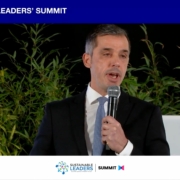Sustainable Leaders’ Summit: sustainability at the heart of managerial professions
The Sustainable Leaders’ Summit took place both online and physically the 26th of November. It gathered a group of inspirational leaders to discuss the sustainable transition of the European economy. This first edition encouraged managers, social partners and policymakers to pursue change into the workplace and society at large. The one-day event provided important insights on how to bridge the gap between sustainability ambition and reality – by mainstreaming a new type of leadership that empowers sustainable impact through work. The video highlights are now available here.
Started in 2020, the Sustainable Leaders is a European project that introduced sustainable thinking and practices within leadership and management. The program provided leaders with training schemes to gain the necessary leadership knowledge to make sustainability work in the private and public sector. It was also designed to engage social partners and policy makers on this issue and to create policy recommendation to promote sustainable leadership. This very first summit celebrated the conclusion of the project and allowed for the speakers to discuss their findings. They debated about the sustainability challenges managers are facing in their profession and reviewed topics such as climate emergency, circular economy and sustainability education.
‘Managers need training to cope with the new challenges of their evolving jobs’
As CEC’s President Maxime Legrand underlined, jobs and particularly managers’ jobs are constantly evolving. To support the managers and help them understand the current environmental and economic challenges, consistent training and emphasis on education must undergo within the workplace.
Professors Alberto Pastore and Annalisa Massacesi of Sapienza University Rome explained: ‘We need skills for making jobs greener and we need skills to invent new green jobs, thinking them together will be key to achieve our sustainability objectives.’
Throughout their presentation, the academics addressed the skills gap and the lack of sustainability awareness among managers across Europe. Although some concepts and knowledge start being integrated in the workplace, sustainability values and competences are not yet mainstreamed within the corporate environment.
They concluded: ‘A manager who can identify, inspire and implement new strategies, policies and managerial behaviors consistent with the sustainability principles is a sustainable leader. However, Eu managers don’t seem entirely ready for the sustainable transition.’
New leadership for new times
Speakers and academics argued for the need of a new sustainable leadership within a context marked by economic instability, ecological degradation and social polarization. This leadership approach should also open to a younger leadership mindset. Millennials and Gen-Z are entering the job market with different perspectives and expectations than the previous generations. They no longer want to settle for a job, they are looking for a job with meaningful impacts on society, in lines with their values.
Speakers encouraged the active involvement of younger generations, next to social partners and civil society within the EU’s transition policies, but also in corporate sustainability strategies. Without taking people on board and empowering them for sustainable jobs, we won’t go far, observed Esther Lynch from ETUC: ‘There are whole communities, around coal or the automotive industry that are afraid of the impact of the transition. We need to take these workers on board to make sustainability a success’
All sectors will be subjected to restructuring and managers play a key role in this transition. Industries and managers need to understand the trends of today and adjust their performance indicators to focus on well-being, health and happiness.
Finally, managers should be included in policies and packages regarding sustainable employment and leadership. Institutions such as the European Commission must do more to ensure this transition toward sustainable practices across Europe.
New thinking patterns
The Sustainable Leaders’ Summit hosted several panel discussions, the last keynote presented by Carol Sanford urged the participants to re-think their approach to sustainability and business: ‘You cannot change the world by using the same thinking that created our problems. We need to re-examine ourselves and see our effects in the world. (…) By controlling, fragmenting and putting people and organizations into boxes, we produce degenerative effects. We need to move towards a living systems understanding.’
This first summit paved the way for leaders across Europe to incorporate sustainability in their core values but also to reevaluate their positions and priorities for their businesses. Social dialogue and social partners have to better support workers and managers in achieving these goals. Building new capacities and drafting fairer policies integrating education and sustainability will make the green transition possible. That’s why in early 2022, project leader CEC European Managers will publish the final report of the Sustainable Leadership Project, with a set of recommendations for mainstreaming sustainable leadership within private and public sector management.
More information
Sustainable Leadership in Europe Report published
CEC European Managers has published a new report on the state of Sustainable Leadership in Europe. The representative findings, based on a survey among 1500 managers from six EU countries, highlight a clear gap between the political ambition of transitioning to a greener and fairer future and the management reality on the ground. While many managers are convinced of the importance of sustainability, it is insufficiently put in practice in companies. The lacking implementation of sustainability measures may be linked to traditional leadership values, inadequate education and training of managers, as well as regulatory pitfalls. 
The current global recession, climate emergency and socio-economic polarisation are a wake-up call. The findings of the « Sustainable Leadership in Europe » report clearly show that managers are aware of the importance and value of sustainability. However, the complex and interrelated challenges are too often not in line with the skills of the people who have to deal with them. Without skilled and committed managers, the required changes towards an economy in line with societal needs and planetary boundaries are likely to fail. The current narrative around the transition too often ignores the human side of things.
“The current challenges, especially the economic crisis, are complex to resolve. Fortunately, our “Sustainable Leadership in Europe” report clearly highlights how to overcome a major obstacle to building a more resilient and sustainable economy. Managers need a European scheme equipping them with the right skills and knowledge needed in this transformation.”
– Ludger Ramme, President of CEC European Managers
It’s now about putting Sustainable Leadership into practice, by targeting those who are responsible for shaping the future of their companies. That’s why the project partners of the “Sustainable Leadership Project”, led by CEC European Managers, are developing an evidence-based European Pilot Training Programme for European managers on Sustainable Leadership. The innovative training will allow providing relevant knowledge, skills and resources for the change-makers of the future.
The « Sustainable Leadership in Europe » research, conducted by Professor Alberto Pastore and his team, introduces a new model of Sustainable Leadership. The reality on the ground, as revealed by the study, shows that ambition and capabilities are in mismatch. Its representative survey among more than 1500 managers in six European countries[1] shows the main areas in which managers need to improve.

The “Sustainable Leadeship in Europe” report gives relevant information about the state of Sustainability in European management.
When it comes to knowledge, many respondents are not aware of key political frameworks and legislation, such as the non-financial reporting directive. As far as values are concerned, only around 40% share values associated with sustainability. The education of managers, but also office culture, can be factors of explanation.. Only few managers are aware on what sustainability indicators are relevant to their organisation, left alone implementing an accurate materiality assessment.
Despite these challenges, the research also highlights that the topic of sustainability has clearly entered the mainstream. There is broad consensus on the importance of sustainability in general and associated indicators, such as respect for human rights or waste reduction, in particular. The comparison between the general managerial population and managers affiliated to CEC European Managers has highlighted how the latter generally score better on Sustainable Leadership, especially in the area of soft skills. A larger involvement of managers in social dialogue and professional associations could thus contribute to improve sustainability performance.
Lastly, the results of the survey can also be seen as an opportunity to put the upskilling of managers on top of political priorities. After the publication of the studies, the project will continue with a series of webinars and seminars, organised for managers from across Europe. Stay tuned!
Visit SustainableLeaders.eu!
Check out the Sustainable Leadership in Europe – Executive Summary
Please find the Press Release here.
[1] Germany, France, Italy, Spain, Poland and Denmark




